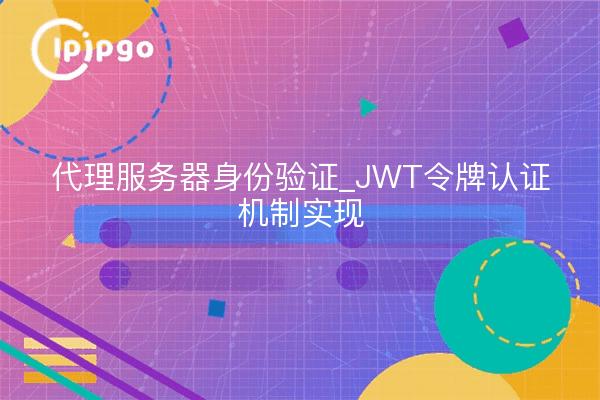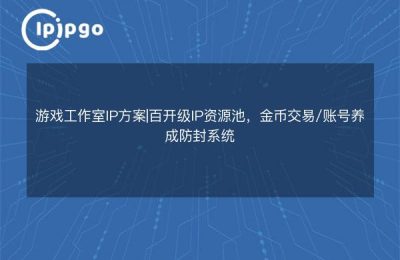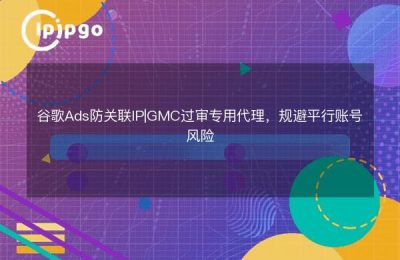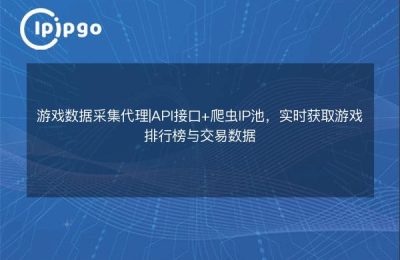
What happens when a proxy server meets JWT authentication?
Imagine that your door lock receives thousands of visitors every day, and traditional password verification is like issuing a key to each visitor, which is both troublesome and insecure. JWT (JSON Web Token) is like an encrypted electronic ID card, the proxy server only need to look at the identity of the visitor can be confirmed. For organizations that use proxy IPs, thisStateless, High Concurrency, Tamper ProofThe characteristics of the program are just the right solution to the authentication challenge when business volume is skyrocketing.
Three steps to build JWT proxy authentication system
Using the ipipgo proxy service as an example, we recommend this configuration process:
Step 1: Generate Exclusive Token Factory
Create API keys in ipipgo console, the system will automatically generate key pairs for encryption. Here is a useful tip: it is recommended to create independent keys for different lines of business, for example, A key for short video capture and B key for e-commerce price monitoring.
Step 2: Token Implantation Client
Generate JWT with this sample code:
header = {"alg": "HS256", "typ": "JWT"}
payload = {"exp": datetime.utcnow() + timedelta(hours=2), "ip_group": "us_residential"}
signature = encryption algorithm (header + payload + secret key)
Special attention is paid to setting reasonable expiration times, and it is recommended that business scenarios be dynamically adjusted - 10 minutes is set for real-time data collection, and 6 hours can be set for batch tasks.
Step 3: Proxy Gateway Verification
When a client initiates a request through the ipipgo proxy, the gateway is automatically verified:
1. Validity of token signatures
2. Whether it is within the validity period
3. IP grouping authority matches
After the verification is passed, the corresponding residential IP resources are allocated immediately, and the whole process is completed within 50 milliseconds.
List of Practical Advantages of JWT Certification
| Scenario pain points | JWT Solutions | ipipgo adaptation program |
|---|---|---|
| Authentication timeout due to high frequency IP switching | Token Pre-Authorization Mechanism | Dynamic IP Pools for Instant Response |
| Large-scale distributed service deployment | Stateless validation | 28 certified nodes worldwide |
| Difficulties with third-party systems integration | standardized agreement | Provide SDK to support 10+ languages |
Five Pitfalls You Might Encounter
Q: What should I do if my token is leaked?
A: ipipgo's key supports hot update mechanism, the old token will be invalidated immediately after replacing the key, meanwhile, you can check the abnormal usage record in the console.
Q: How to control different business IP rights?
A: Add custom fields to the payload, such as specifying {"location": "jp", "isp": " ntt"}, the gateway will automatically match the proxy IP of the corresponding attribute.
Q:Frequent disconnection on mobile causes authentication failure?
A: It is recommended to set up a 5-minute token buffer with ipipgo's IP hold technology to automatically restore the connection during network fluctuations.
Q: How are historical requests traced?
A: Each JWT contains a unique identifier. On the usage analysis page of ipipgo, you can retrieve specific IP usage records by token ID.
Q: Authentication delay due to bursty traffic?
A: ipipgo's authentication cluster uses a load balancing mechanism, with a single node capable of handling 3,000 authentication requests per second and supporting second-level expansion.
Why choose ipipgo?
We found in our testing that when JWT authentication encounters a low-quality proxy IP, theAuthentication succeeds but business failsembarrassing situation. ipipgo's residential IP passes through a triple authentication mechanism:
1. Operator data cross validation
2. Real-time heartbeat detection
3. Operational success rate monitoring
This means that every certified IP is a real and available high-quality resource. Especially if your business requires specific city-level IPs, their LBS location accuracy can be up to street level.
Recently there is an e-commerce customer case: after using the combination of JWT + ipipgo, the effective request rate of its price monitoring system increased from 67% to 92%, and the authentication time consumed decreased from an average of 210ms to 46ms. this fully demonstrates that theA good accreditation mechanism must be accompanied by quality agent resourcesTo maximize value.








